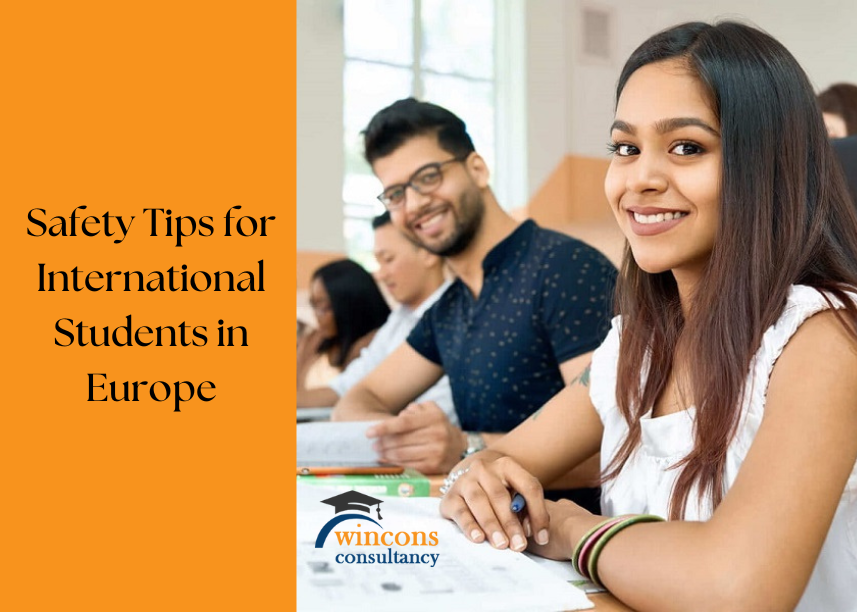

By Wincons Consultancy, June 28th 2024
When you go to Study in Europe, it is an exciting adventure that offers many cultural experiences and academic opportunities. Being in a foreign environment also brings its own challenges, especially when it comes to safety. Here are some important safety tips for international students in Europe to ensure a safe and enjoyable stay.
1. Familiarize yourself with and understand local laws and customs
Before arriving in the host country, take time to research and understand local laws, customs, and cultural norms. This knowledge will help you avoid unintentional offense and help you navigate social situations more comfortably to study in Europe.
2. Keep important documents in a safe place
Always keep important documents such as passport, visa, student card and health insurance information in a safe place. Both physical and digital copies are good to keep safe. If possible, use a safe, locked box or safe in your apartment.
3. Stay up to date with local news
Stay up to date with local news and events in your country. Being aware of political unrest, natural disasters or other major events can help you avoid dangerous situations. To Study in Europe connect with Wincons Consultancy now.
4. Register with your embassy
Register with the embassy or consulate of your home country upon arrival. This can be very helpful in an emergency as they can provide assistance and inform you of any security issues.
5. Use reliable transportation
Use reputable transportation options when traveling. Public transport is generally safe to study in Europe, but it is important to be careful, especially at night. Avoid unlicensed taxis and choose registered services such as Uber or well-known local taxi companies.
6. Be aware of your surroundings
Always be aware of your surroundings, especially in crowded places such as tourist attractions, public transport and markets. Burglary is common in many European cities, so secure your belongings and avoid displaying valuables in public. But despite such things, to look forward to a bright future, study in Europe, ask how to Wincons Consultancy.
7. Follow local COVID-19 guidelines
In light of the COVID-19 pandemic, it is extremely important to know and follow local health regulations. This includes wearing masks, maintaining social distance and complying with quarantine or vaccination requirements.
8. Know emergency contact information
Familiarize yourself with local emergency numbers. While you study in Europe, 112 is the general emergency number you can call in case of a police, fire or medical emergency. Additionally, save contact information for your university's emergency services, your country's embassy, and trusted friends or family members.
9. Secure Your Residence
To study in Europe, make sure your residence is secure. Check that all windows and doors are properly locked and never let strangers into your apartment. If you live in a dormitory or shared accommodation, discuss safety measures with your roommates.
10. Stay Connected
Stay in touch with family and friends at home regularly. Tell them your location and travel plans. This not only puts them at ease, but also ensures that someone knows your location in case of an emergency.
11. Be careful with alcohol and nightlife
Although it is natural to want to enjoy the nightlife while you go to study in Europe, do it responsibly. Watch your alcohol consumption and never leave a drink unattended. Avoid walking alone at night and always have a plan to get back to your accommodation safely.
12. Use technology wisely
Use technology to improve your safety. Download apps that provide real-time updates on public transport, local news and emergency services. Google Maps helps you navigate in unfamiliar places, and translation apps help you communicate.
13. Respect cultural differences
Respect the cultural differences and norms of your host country. This includes dressing appropriately, understanding social etiquette and being polite when interacting. Respect can prevent misunderstandings and help you blend seamlessly into the local community.
14. Ask for help when you need it
If you feel unsafe or have problems, seek help. Your university likely has resources for international students, including counseling services and support groups. Use these resources to solve any problems you may have. To study in Europe, contact Wincons Consultancy.
Conclusion
When studying abroad, safety is paramount. By being prepared and aware, you can minimize risk and focus on making the most of your international experience. Remember that staying informed, connected and respectful are key factors in ensuring your safety and well-being as an international student in Europe. Enjoy your adventure, but always put your safety first. Contact wincons Consultancy now.